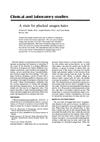49 citations,
July 2000 in “Journal of Histochemistry & Cytochemistry” POMC-derived peptides are important for skin functions like immune response and stress management.
 26 citations,
September 2018 in “Colloids and Surfaces B: Biointerfaces”
26 citations,
September 2018 in “Colloids and Surfaces B: Biointerfaces” A new liposome treatment helps heal deep burns on mice by improving hair regrowth and reducing scarring.
 31 citations,
January 2017 in “Phytotherapy Research”
31 citations,
January 2017 in “Phytotherapy Research” Ziziphus jujuba Mills may have health benefits, but more research is needed to confirm its safety and effectiveness.
 59 citations,
June 2008 in “Journal of The American Academy of Dermatology”
59 citations,
June 2008 in “Journal of The American Academy of Dermatology” The article explains the genetic causes and symptoms of various hair disorders and highlights the need for more research to find treatments.
 4 citations,
October 2005 in “Pediatric Transplantation”
4 citations,
October 2005 in “Pediatric Transplantation” Pediatric transplant patients often experience unique skin changes mainly due to medication use.
 January 2007 in “Journal of The American Academy of Dermatology”
January 2007 in “Journal of The American Academy of Dermatology” Eating disorders can cause hair loss in patients.
 6 citations,
September 1994 in “Veterinary Clinics of North America: Small Animal Practice”
6 citations,
September 1994 in “Veterinary Clinics of North America: Small Animal Practice” The document concludes that accurate diagnosis is crucial for effectively treating various ear diseases in dogs and cats.
12 citations,
January 2013 in “Indian Journal of Dermatology” Monilethrix is a rare genetic hair disorder that's hard to treat.
 212 citations,
September 2008 in “Journal of The American Academy of Dermatology”
212 citations,
September 2008 in “Journal of The American Academy of Dermatology” Minoxidil and finasteride treat hair loss in men, while minoxidil treats hair loss in women.
 17 citations,
August 1979 in “Journal of The American Academy of Dermatology”
17 citations,
August 1979 in “Journal of The American Academy of Dermatology” A new staining method helps tell growing from resting hairs to diagnose hair loss.
 27 citations,
July 2018 in “Journal of optometry”
27 citations,
July 2018 in “Journal of optometry” Eyelashes protect the eyes, but more research is needed to understand how.
 4 citations,
September 2020 in “Annals of Translational Medicine”
4 citations,
September 2020 in “Annals of Translational Medicine” Concentrated nanofat helps mice grow hair by activating skin cells and may be used to treat hair loss.
 June 2011 in “Journal of clinical and experimental investigations”
June 2011 in “Journal of clinical and experimental investigations” Oral zinc sulphate is an effective and safe treatment for thallium poisoning.
 January 2007 in “Journal of The American Academy of Dermatology”
January 2007 in “Journal of The American Academy of Dermatology” Propylthiouracil, a thyroid medication, can cause skin blood clots and immune-related blood vessel inflammation.
 January 2007 in “Journal of The American Academy of Dermatology”
January 2007 in “Journal of The American Academy of Dermatology” Post-steroid panniculitis is now rare because doctors taper steroids more carefully.
34 citations,
January 2022 in “Molecules/Molecules online/Molecules annual” Natural ingredients in cosmeceuticals are beneficial for skin and hair health with few side effects.
 67 citations,
April 2007 in “Journal der Deutschen Dermatologischen Gesellschaft”
67 citations,
April 2007 in “Journal der Deutschen Dermatologischen Gesellschaft” Shampoos are designed to clean and improve hair and scalp health, with specific ingredients for different hair types and conditions.
 9 citations,
September 2006 in “Clinical Pediatrics”
9 citations,
September 2006 in “Clinical Pediatrics” Pediatricians should treat some hair loss types in children and refer others to a dermatologist.
July 2005 in “Indian Journal of Dermatology”  2 citations,
September 2020 in “Biomedical materials”
2 citations,
September 2020 in “Biomedical materials” Recombinant keratin materials may better promote skin cell differentiation than natural keratin.
January 2020 in “Menoufia Medical Journal” IGF-1R may play a role in female hair loss and could be a treatment target.
 4 citations,
November 2021 in “Cancers”
4 citations,
November 2021 in “Cancers” The document concludes that understanding and managing hair loss in cancer patients is important, and more research is needed for better treatments.
 53 citations,
September 1999 in “The journal of cell biology/The Journal of cell biology”
53 citations,
September 1999 in “The journal of cell biology/The Journal of cell biology” K16 can partially replace K14 but causes hair loss and skin issues.
April 2023 in “Science of The Total Environment” 2 citations,
June 2024 in “Journal of Clinical Medicine” Alopecia Areata can affect nails, often improving on its own, but JAK inhibitors may help.
 January 2018 in “Journal of translational science”
January 2018 in “Journal of translational science” Eating alfalfa sprouts every day can raise testosterone levels in middle-aged men, but broccoli sprouts don't have this effect.
 29 citations,
January 2007 in “American Journal of Clinical Dermatology”
29 citations,
January 2007 in “American Journal of Clinical Dermatology” Eyebrow loss has many causes and requires accurate diagnosis for proper treatment.
 January 2003 in “American Journal of Clinical Dermatology”
January 2003 in “American Journal of Clinical Dermatology” In 2002, various skin reactions were reported due to different drugs, including allergies, hair loss, skin lesions, and other skin conditions.
37 citations,
October 2017 in “Saudi pharmaceutical journal” All evaluated shampoos meet Saudi standards.

Benign skin tumors need accurate diagnosis to ensure proper treatment.





















